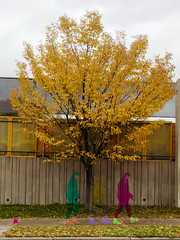water in the heart of the city
Jin Zhu

As of 2005, UNICEF estimates that 1.1 billion people lack access to safe clean water, and that is not including the 1.1 billion that gained access to clean water between 1990-2002. It is estimated that by 2025, 2/3rds of the world population will be living under moderate to severe water shortage/stress. This page from the UN is not much to look at, but it has some facts and links to PDFs of the appropriate studies.
The larger jugs represent the World Health Organization's standard of the minimum daily amount of clean water needed to maintain health - 20 liters, or 5 gallons. (In contrast, in the US, the average person uses 400 liters - 100 gallons - per day, and that number increases tenfold if indirect industrial and agricultural uses are factored in.)
It is a somewhat debated number since it includes washing and sanitation as well as cooking and drinking, so technically it is not the bare minimum, though studies have also shown that access to 30+ liters of water per day decreases the incidence of diarrhea significantly.
Getting water is a huge hardship since access points can be dangerous, and sometimes women are raped as a price of getting water. Cristiana Bertocchi, our tour guide, related a story of a Somalian woman who was eaten by a crocodile as she was retrieving water from a river.
Chores such as procuring water (and almost all the manual labor in a household) are often considered the women and children's work. Another WHO stat - you are considered to have access to water if you can get 20 liters within 1 km, but that doesn't take into account barriers, political situations and the simple problem of hauling 5 gallons of water without any mechanical help on unpaved roads up and down hills. One of these jugs will filled up, and though I was able to lift it, I don't think I could carry it very far, especially if I wasn't in the best health or well-nourished.
Sometimes it takes hours to make a trip to procure water, and you can imagine that if you have to spend 3 hours a day just getting water in addition to the other hours you spend procuring food, cooking, taking care of your children and doing various other chores, you would not have much time or energy to educate yourself, think about your rights or have much of a plan other than "one foot in front of the other."
View Project:




